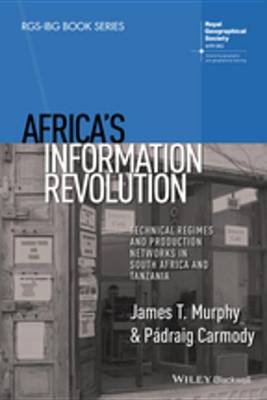RGS-IBG Book
2 total works
Africa's Information Revolution was recently announced as the 2016 prizewinner of the Royal Academy for Overseas Sciences - congratulations to the authors James T. Murphy and Padraig Carmody!
Africa's Information Revolution presents an in-depth examination of the development and economic geographies accompanying the rapid diffusion of new ICTs in Sub-Saharan Africa.
- Represents the first book-length comparative case study ICT diffusion in Africa of its kind
- Confronts current information and communication technologies for development (ICT4D) discourse by providing a counter to largely optimistic mainstream perspectives on Africa's prospects for m- and e-development
- Features comparative research based on more than 200 interviews with firms from a manufacturing and service industry in Tanzania and South Africa
- Raises key insights regarding the structural challenges facing Africa even in the context of the continent's recent economic growth spurt
- Combines perspectives from economic and development geography and science and technology studies to demonstrate the power of integrated conceptual-theoretical frameworks
- Include maps, photos, diagrams and tables to highlight the concepts, field research settings, and key findings
The Urban Question in Africa
by Pádraig Carmody, James T. Murphy, Francis Owusu, and Richard Grant
Illuminates the path to more generative urban transitions in Africa's cities and developing rural areas
Africa is the world's most rapidly urbanizing region. The predominantly rural continent is currently undergoing an “urban revolution” unlike any other, generally taking place without industrialization and often characterized by polarization, poverty, and fragmentation. While many cities have experienced construction booms and real estate speculation, others are marked by expanding informal economies and imploding infrastructures.
The Urban Question in Africa: Uneven Geographies of Transition examines the imbalanced and contested nature of the ongoing urban transition of Africa. Edited and authored by leading experts on the subject, this unique volume develops an original theory conceptualizing cities as sociotechnical systems constituted by production, consumption, and infrastructure regimes. Throughout the book, in-depth chapters address the impacts of current meta-trends—global geopolitical shifts, economic changes, the climate crisis, and others—on Africa's cities and the broader development of the continent.
- Presents a novel framework based on extensive fieldwork in multiple countries and regions of the continent
- Examines geopolitical and socioeconomic topics such as manufacturing in African cities, the green economy in Africa, and the impact of China on urban Africa
- Discusses the prospects for generative urbanism to produce and sustain long-term development in Africa
- Features high-quality maps, illustrations, and photographs
The Urban Question in Africa: Uneven Geographies of Transition is essential reading for undergraduate and postgraduate students in geography, urban planning, and African studies, academic researchers, geographers, urban planners, and policymakers.

